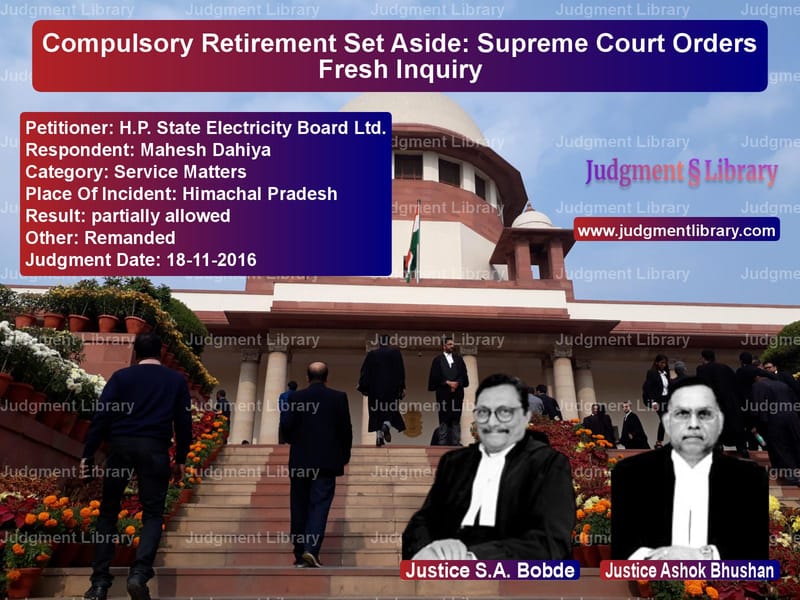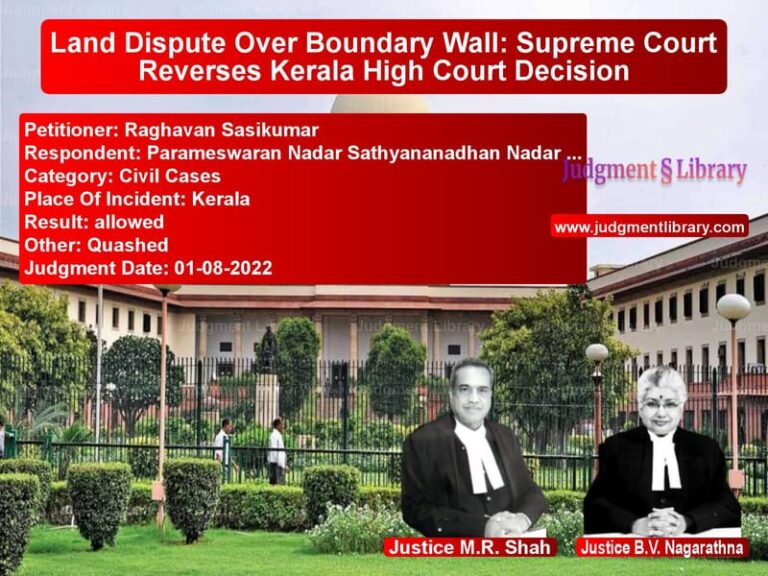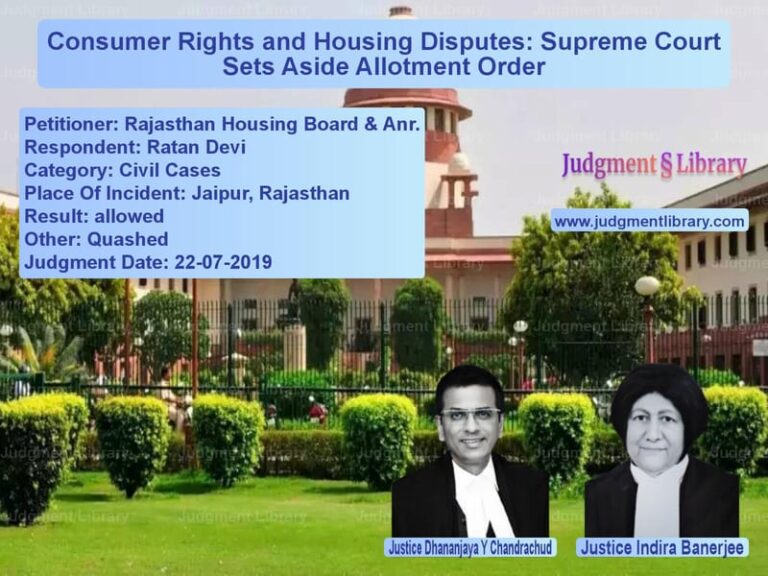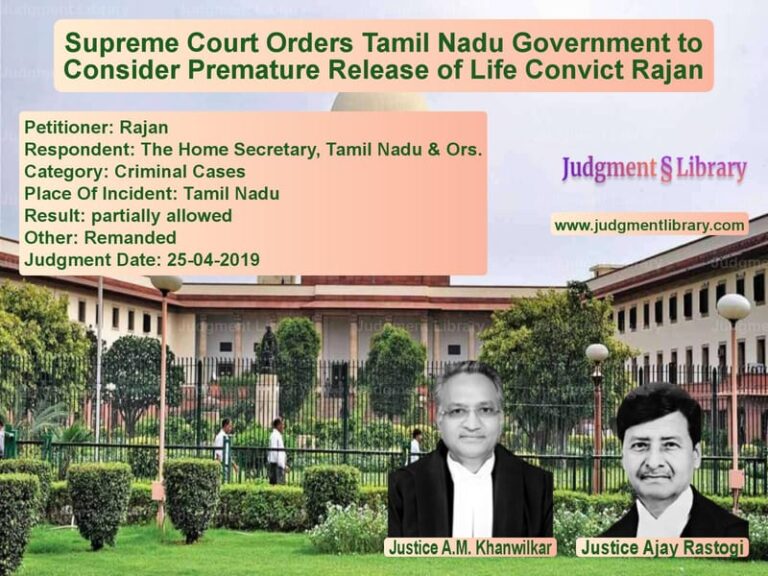Compulsory Retirement Set Aside: Supreme Court Orders Fresh Inquiry
The case of H.P. State Electricity Board Ltd. vs. Mahesh Dahiya is a landmark judgment delivered by the Supreme Court of India on November 18, 2016. The case revolves around the principles of natural justice in disciplinary proceedings, particularly regarding an employee’s alleged unauthorized absence and the failure of the Disciplinary Authority to adhere to due process.
Background of the Case
The dispute arose when Mahesh Dahiya, an officer in the H.P. State Electricity Board (HPSEB), was placed under disciplinary action for alleged unauthorized absence from duty. The respondent was a Senior Executive Engineer, who, after being repatriated from deputation, applied for leave due to illness. However, the Board directed him to appear before a Medical Board, which he failed to do, leading to disciplinary proceedings.
Following an inquiry, Dahiya was compulsorily retired. His appeal was rejected by the Appellate Authority, prompting him to file a writ petition in the Himachal Pradesh High Court. The Single Judge allowed his petition, ruling that natural justice had been violated. The HPSEB challenged this decision in a Letters Patent Appeal (LPA), but the Division Bench upheld the Single Judge’s ruling, leading to the present appeal before the Supreme Court.
Key Legal Issues Considered
- Did the HPSEB follow the principles of natural justice in its disciplinary proceedings against the respondent?
- Was the Disciplinary Authority justified in imposing compulsory retirement without properly considering the respondent’s medical condition?
- Did the High Court err in setting aside the disciplinary proceedings entirely instead of remanding the matter for fresh consideration?
Arguments Presented
Appellant (HP State Electricity Board) Arguments:
- The respondent failed to appear before the Medical Board despite multiple notices.
- Even if his absence was due to illness, he disobeyed direct orders from superior officers.
- The inquiry was conducted per the Central Civil Services (Classification, Control, and Appeal) Rules, 1965, and the respondent was given ample opportunities to defend himself.
Respondent (Mahesh Dahiya) Arguments:
- His absence was due to tuberculosis, a medical condition beyond his control.
- The Disciplinary Authority had prejudged the matter without considering his defense.
- The copy of the Inquiry Report was not furnished before the final decision, violating Rule 15(2) of the CCS (CCA) Rules.
- The principles of natural justice were violated as his representation was not considered before imposing the punishment.
Supreme Court’s Observations
The Supreme Court examined whether due process was followed in the disciplinary proceedings and whether the respondent was given a fair opportunity to defend himself.
The Court emphasized that:
“Before making an opinion with regard to punishment, the delinquent officer must be given an opportunity to submit representation on the inquiry report. The opinion formed by the Disciplinary Authority before obtaining the comments of the delinquent violates the principles of natural justice.”
The Supreme Court found that:
- The Disciplinary Authority had prejudged the case and decided on punishment even before considering the respondent’s representation.
- The respondent’s illness (tuberculosis) was not properly evaluated, and no effort was made to accommodate medical evidence.
- The requirement under Rule 15(2) of the CCS (CCA) Rules, 1965, to provide a copy of the Inquiry Report before imposing punishment, was not met.
Final Judgment
The Supreme Court ruled as follows:
- The disciplinary proceedings violated the principles of natural justice.
- The orders of the Disciplinary Authority and the Appellate Authority were set aside.
- The case was remanded back to the Disciplinary Authority to restart proceedings from the point where the violation occurred (i.e., before imposing punishment).
- The Disciplinary Authority was directed to provide the Inquiry Report to the respondent and allow him to submit a representation before taking further action.
- The fresh proceedings were to be completed within three months.
The appeal was partially allowed, as the Supreme Court did not entirely quash the disciplinary proceedings but directed a fair reconsideration.
Impact of the Judgment
This ruling has significant implications:
- It reinforces the necessity of following natural justice in disciplinary actions.
- It clarifies that an employee must be heard before punishment is finalized.
- It ensures that public sector employees are not arbitrarily penalized without due process.
- It highlights that medical evidence must be adequately considered in cases of alleged absenteeism.
Conclusion
The Supreme Court’s judgment in H.P. State Electricity Board Ltd. vs. Mahesh Dahiya reaffirms the necessity of procedural fairness in disciplinary proceedings. By ensuring that the employee is heard before finalizing punishment, the judgment upholds the principles of justice and fair play in public employment. The ruling serves as an important precedent in employment law, emphasizing that disciplinary proceedings must strictly adhere to statutory requirements.
Don’t miss out on the full details! Download the complete judgment in PDF format below and gain valuable insights instantly!
Download Judgment: H.P. State Electrici vs Mahesh Dahiya Supreme Court of India Judgment Dated 18-11-2016.pdf
Direct Downlaod Judgment: Direct downlaod this Judgment
See all petitions in Disciplinary Proceedings
See all petitions in Employment Disputes
See all petitions in Public Sector Employees
See all petitions in Judgment by S. A. Bobde
See all petitions in Judgment by Ashok Bhushan
See all petitions in partially allowed
See all petitions in Remanded
See all petitions in supreme court of India judgments November 2016
See all petitions in 2016 judgments
See all posts in Service Matters Category
See all allowed petitions in Service Matters Category
See all Dismissed petitions in Service Matters Category
See all partially allowed petitions in Service Matters Category







